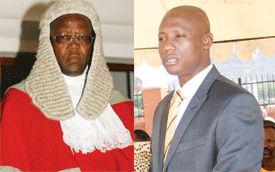Debate
| Thursday November 11, 2010 00:00


This has become a one string question that pops up now and then in the debate that has erupted in the public square following that decision. The debate promises to continue for sometime. The 'decision' was the Chief Justice ruling last Friday that Kgosi Kgafela and 13 other accused persons, whose bail had been revoked by Gaborone Chief Magistrate Barnabas Nyamadzabo should be given bail. The lower court revoked the bail over what it said was persistent failure to stop the floggings in the Kgatleng area.
While a ruling for the remand of all 14, Kgosi Kgafela and 12 others escaped from lawful custody. There was a two-day search before the fugitives surrendered to authorities. It was after their escape from lawful custody, and their subsequent remand, that the Chief Justice extended bail to them.
While the view of some sections of the public is that the decisions of judges are generally sacrosanct there has been inescapable temptation to scrutinise the decision of the Chief Justice. The unavoidability of the scrutinisation of the decision might lie in the fact that two days before the honourable Chief Justice refused to recuse himself from the Bakgatla case another judge of the same court, Judge Key Dingake voluntarily recused himself from another case. There are of course some similarities between the two cases and the grounds raised for recusal.
Judge Dingake recused himself from the Joe Matome bail application because Matome's lawyers in the case happened to be the same lawyers that the judge is using in his own case- a defamation suit we may just add.
When arguing that the Chief Justice should recuse himself from the Bakgatla case, the prosecution argued that there is a relationship between Kgosi Kgafela and the Chief Justice. It is common knowledge that Kgosi Kgafela, then a practicing attorney acted for Justice Maruping Dibotelo in a defamation suit against Mmegi. The Chief Justice actually confirms his relationship with Kgosi Kgafela in his own words:
'I want to disclose that when Kgafela was still practicing, he represented me in a single suit where I was suing for defamation. We still talk, the last being during his coronation.'
The Chief Justice says that was nine years ago. Might we just add that the daughter of the Chief Justice, who is a law student at the University of Botswana has been doing her internships at Kgosi Kgafela's law firm. Need we say more?
There were others who said on the sidelines that the Chief Justice is acquainted with Unity Dow, the Bakgatla royals: we do not think this weighs much though.
The public is entitled to ask: When is it right for a judge to recuse himself/herself from a case? Did Chief Justice Dibotelo do the right thing by refusing to recuse himself.
Did Justice Dingake do the right thing by recusing himself? We understand that recusal is at the discretion of a judge, often based on conscience.
We can further ask, when all is said and done is public perception ever taken into consideration? Is it important?
As the public we will never know as these are weighty matters which can best be thrashed out by the learned judges and learned friends in chambers. However we submit that it is confusing though when one judge recuses himself and another refuses to recuse himself on matters that to a lay person appear to be too similar?
We do not pretend to have the answers nor do we think we can help the public debate in anyway but hopefully the words of the prosecution in pleading with the Chief Justice to recuse himself from the case might help to focus the debate.
'While we hold this court in the greatest esteem, we submit that justice may not seem to be done if your lordship presides over this matter.
The Chief Justice's association with Kgafela leaves reasonable apprehension that your lordship may not be able to put aside sympathy for a man who came to your rescue in a private matter. We are not saying you [will be] biased, but rather that there is reasonable apprehension on our part and something that you may need to consider,' the prosecution submitted.
